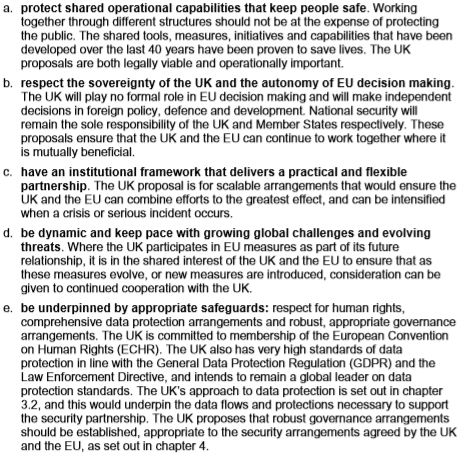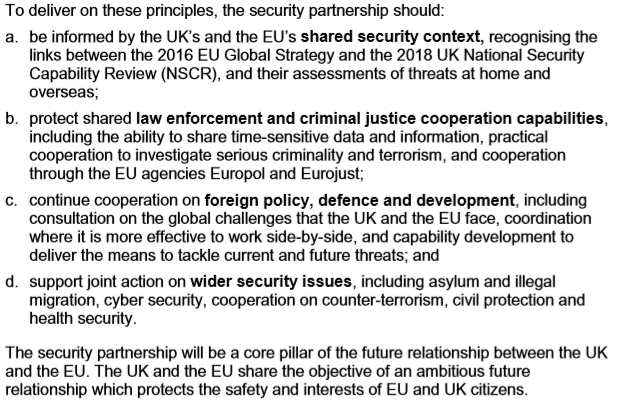: SECURITY PARTNERSHIP :
Chapter 2
The challenge:
The UK and the EU face a host of new and growing security threats and challenges. These are unprecedented and do not recognise the borders of individual nations or discriminate between them. The threats call for a pan-European response.
As European Council on Foreign Relations has pointed out - Keeping Europe Safe after Brexit - "Now is not the moment for either the EU or the
UK to risk allowing the political tensions around Brexit to harm
their own interests or weaken protection of their citizens. On the contrary,
this is a moment that demands cooperation, investment in research and
capabilities, and renewed commitment in order to deepen European security,
regardless of Brexit.
While the UK’s departure from the EU is a major challenge to
Europe’s continued cooperation on security matters, in particular given the
political and institutional obstacles that it entails, this event could also
serve as a valuable opportunity to look critically at the array of threats that
Europe is currently facing as well as the ways in which it should respond to
them. From that perspective, the issue of EU-UK post-Brexit cooperation on
security should not get bogged down in procedural matters around EU treaties
and the process side of exit. Instead it should be an inherently political and
a strategic matter. The question that we should be asking is about how to
develop a new EU-UK security partnership that enhances Europe’s comprehensive
security and its power in the world."
In her speech at Munich (February 2018), the Prime Minister set out an ambitious vision for the UK's future security relationship with the EU. The UK seeks an ambitious partnership covering the breadth of security interests including foreign policy, defence, development, law enforcement and criminal justice cooperation. This should be supported by ongoing cooperation through partnership programmes and key safeguards such as individual rights, data protection and robust governance arrangements.
Background material:
The following are useful sources of additional information.
EU Council - Policies - Defence and Security
EU Council - Timeline showing the development of EU involvement in security and defence since 1991 including the Common Security and Defence Policy (CSDP) adopted by the 2009 Lisbon Treaty.
Institute for Government - Explainers - Defence and Security Cooperation
Background material:
The following are useful sources of additional information.
EU Council - Policies - Defence and Security
EU Council - Timeline showing the development of EU involvement in security and defence since 1991 including the Common Security and Defence Policy (CSDP) adopted by the 2009 Lisbon Treaty.
Institute for Government - Explainers - Defence and Security Cooperation
Defence in Depth - What to read on Brexit, security and defence
Royal United Services Institute - Briefing Papers - Brexit and European Security - "The UK’s vote to leave the EU was not primarily about
security. But it could have serious consequences for future security
cooperation between the UK and its European neighbours. Prime Minister Theresa
May made it clear in her speech to the Munich Security Conference on 17
February that she wanted to build a ‘deep and special partnership’, which will
allow the UK and the EU to ‘retain the cooperation that we have built and go
further in meeting the evolving threats that we face together’. Achieving this
objective will not be straightforward, and will require a strong effort from
both the UK and the EU at a time of considerable turbulence in the overall
relationship."
NATO and the EU:
Shared Security Context - see 2.2 at pages 53 - 54. This section of the White Paper sets out a common assessment of threats:
Law Enforcement and criminal justice cooperation - see para 2.3 at pages 54 - 63.
The White Paper then develops the law enforcement theme -
Data Exchange (para 2.3.1) including information about airline passengers; alerts to police and border forces; exchange of criminal records; and DNA / Fingerprint / Vehicle Registration data.
Practical cooperation (para 2.3.2) covering extradition of wanted individuals; cooperation between judicial, police and customs authorities; and cross border criminal investigation and prosecution teams.
Agencies (para 2.3.3) covering serious and organised crime and terrorism (Europol); investigations and prosecutions of serious criminal cases.
Foreign policy, defence and development - see para 2.4 at pages 63-69.
The UK proposes a "tailored partnership" with the EU covering -
(a) to (g) are amplified in the remainder of section 2.4.
Wider Security Issues - section 2.5 at pages 69-72
The UK's approach for continued cooperation in some key areas is set out -
- Increasing threat posed by terrorism, extremism and instability - e.g. attacks across Europe
- The resurgence of state-based threats - e.g. a well-established pattern of Russian state aggression and disruption.
- Erosion of the rules-based international order - e.g. stalemates in the UN Security Council on the use of chemical weapons in Syria
- Ongoing growth in serious and organised crime
- The impact of technology, especially cyber threats - several States seek to target and exploit UK and European networks to gather intelligence or intellectual property.
- Diseases, natural hazards and deliberate threats affecting the UK and the EU - e.g. the 2014 Ebola outbreak-----
The White Paper then develops the law enforcement theme -
Data Exchange (para 2.3.1) including information about airline passengers; alerts to police and border forces; exchange of criminal records; and DNA / Fingerprint / Vehicle Registration data.
Practical cooperation (para 2.3.2) covering extradition of wanted individuals; cooperation between judicial, police and customs authorities; and cross border criminal investigation and prosecution teams.
Agencies (para 2.3.3) covering serious and organised crime and terrorism (Europol); investigations and prosecutions of serious criminal cases.
-----
Foreign policy, defence and development - see para 2.4 at pages 63-69.
The UK proposes a "tailored partnership" with the EU covering -
(a) to (g) are amplified in the remainder of section 2.4.
-----
Wider Security Issues - section 2.5 at pages 69-72
The UK's approach for continued cooperation in some key areas is set out -
: Cross-cutting and other cooperation :
There are other areas where cooperation supports or complements the proposals for the economic and security partnerships. The UK and the EU should agree specific arrangements that support ongoing cooperation.
Those headings are amplified in sections 3.2 (Data Protection); 3.3 (Classified information); 3.4 (Cooperative accords); 3.5 (Fishing opportunities).
-----
Data Protection - section 3.2 at pages 73-76 seeks a future UK-EU agreement that -
-----
Classified information - section 3.3 at page 76 - the UK and the EU have commenced discussions on a Security Information Agreement on classified information which would facilitate, but not mandate, the exchange of classified information.
-----
Cooperative accords - section 3.4 at pages 76-81.
a) Science and Innovation - section 3.4.1 - UK proposes a science and innovation accord that -
b) Culture and Education - section 3.4.2 - UK proposes an accord that -
c) Overseas Development Assistance and International action - section 3.4.3 - An accord that -
d) Defence research and capability development - section 3.4.4 - an accord providing for UK participation in -
e) Space - a Space Accord that -
-----
Fishing Opportunities - section 3.4 at pages 81-83. The UK proposes -



















No comments:
Post a Comment